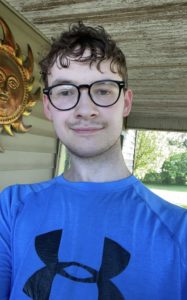Journeys to Humanism: Self-Acceptance

Journeys to Humanism, theHumanist.com’s regular series, features real stories from humanists in our community. From heartwarming narratives of growth, to more difficult journeys, our readers open up about their experiences coming to humanism.
Dustin Daniels
Crossville, Tennessee
On June 26, 2015, the U.S. Supreme Court affirmed same-sex marriage as a constitutional right. As a fourteen-year-old gay kid, I witnessed a historical, life-changing event I thought I would never live to see.
Before this, I accepted that living as a gay person in Tennessee meant I could not marry, adopt children, or be protected against discrimination. However, on that day, I watched the first same-sex couple to marry in Knox County on live television. In doing so, I also realized for the first time that I am entitled to the same human rights as everyone else.
When I was in eighth grade, I came out to all of my friends, and most of them welcomed me with open arms. During this time, I reflected upon my life and what led me to accept myself. Growing up, I was raised in a non-practicing, Christian household where we never prayed, never read scripture, never attended church, and rarely discussed religion. Because of my family’s lack of religious commitment, I felt isolated among my friends, classmates, and extended family who all identified as Christians.
At one point, I even tried to attend church with my aunt and uncle—who identified as conservative, Southern Baptists at the time. However, I soon realized that religious ideals such as Heaven and Hell terrified me. I spent years undoing my fear of eternal damnation because I felt no comfort towards the church, biblical values, other Christians, or even the idea of a god. None of it made sense and I felt so scared and alone.
Adolescence was a time when I explored my true feelings and beliefs, including ones related to religion. I researched tons of religious or spiritual groups, sects, and identities, including but not limited to Islam, Judaism, Buddhism, Hinduism, Taoism, Jainism, Wicca, Paganism, and Unitarian Universalism. While I identified with some more than others, I never found one that I agreed with enough to practice or attend services for.
During this exploration, I found out about the term “agnostic.” This word perfectly summarized my uncertain views about whether God existed or not, or even whether evidence for such a being existed or not. In middle school, this identity allowed me to continue to explore religion and help me realize that I believed in none of it.
Just as I accepted myself as gay, during the same year, I also accepted myself as an atheist. Both coming out experiences gave me the courage to live life more authentically as the years continued.
This journey has made me realize one thing: instead of focusing on religion or god, we need to focus on each other. All humans are entitled to the same rights to autonomy, dignity, and respect. The fight to preserve these rights has been a passion of mine ever since I, as an atheist and humanist student, protested a Ten Commandments display in my public high school at age sixteen. Since then, I have fought against school-sponsored religion throughout Middle and East Tennessee public schools as well as protesting against gendered dress codes, anti-LGBTQIA+ legislation, power-based violence, and much more.
Life as a humanist has allowed me the chance to live for myself and others without fear. I learned that the only way to make it is to fight for what you believe in and create a better world for all human beings. Seven years ago, as I learned to understand and accept myself, I also learned to better understand and accept others as well. Everyone is entitled to a life of safety, peace, and happiness. Humanism shines a light on this fact and I am so proud to identify with it.
We all have our own stories of how we came to be humanists, and we want to hear yours! Fill out the form here to be featured in this series. You can also share your journey and chat with others on the Journeys to Humanism channel on the AHA’s Discord Server.
